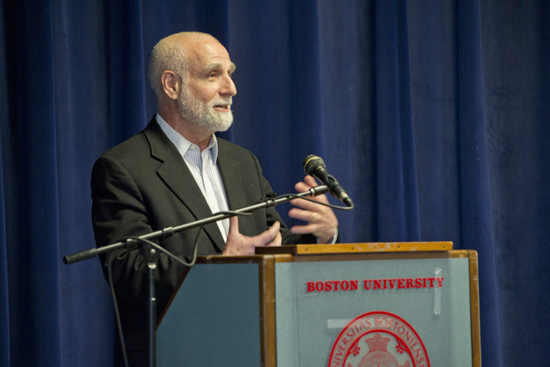$2.5 Million Gift Creates Maria Stata Professorship
Endowment focuses on classical Greek studies

David Roochnik has been named the inaugural Maria Stata Professor in Classical Greek Studies. Photo by Vernon Doucette
The culture of ancient Greece is alive and well and living conspicuously, for those who pay attention, in the sciences, arts, architecture, politics, and philosophy of our everyday world. Now, thanks to a gift from Maria Stata (CAS’62), that enduring influence will be even more greatly appreciated by students and scholars in the College of Arts & Sciences.
The $2.5 million gift creates the Maria Stata Professorship in Classical Greek Studies, which will support a distinguished senior faculty member with scholarly and teaching expertise in the classical period of Greek history. And while BU has a sizable community of scholars who focus on ancient Greece from several perspectives, including classical studies, history, and political science, the inaugural Maria Stata Professor is David Roochnik, a CAS professor and chair of philosophy.
“Ancient Greece is a living world,” says Roochnik. “It is filled with spectacular ideas that are as important and powerful today as they were 2,500 years ago. No one should miss it.”
“This wonderful gift from Maria Stata will make a significant and lasting difference to our classical studies program,” says BU President Robert A. Brown. “It will ensure that students for generations to come will be able to study under accomplished scholars in this important interdisciplinary field, and I very much appreciate Maria’s recognition of the value of classical studies and her dedication to her alma mater.”
Stata, whose husband, Ray Stata, is cofounder and chairman of semiconductor and signal processing company Analog Devices, asked that her gift support a professor who would ensure that undergraduates who may not be majoring in classics have the chance to study the mark of ancient Greece on Western civilization, says Virginia Sapiro, dean of Arts & Sciences and a professor of political science. “Mrs. Stata wanted to support Boston University’s ability to educate students about that important society and its contributions to culture, art, architecture, philosophy, science, and literature,” Sapiro says. “Indeed, these influences remain profound today, although most of our students may not know it if they don’t study it.”
An international search by a committee of professors from relevant departments across the University to fill the position began two years ago. Potential holders of the professorship may hail from many disciplines, says Sapiro, as long as they focus on an area of importance to the understanding of classical Greek antiquity, among them art, history, literature, philosophy, and science.
Sapiro says she was delighted with the search committee’s choice. “David Roochnik is a distinguished scholar, a scholar’s scholar who has a great passion for his writing and his subject,” she says, “and at the same time he is one of our most skillful and dedicated teachers of students at all levels.”
Roochnik has taught in the philosophy department and the Core Curriculum since arriving at BU in 1995. His work focuses broadly on classical Greek political philosophy, primarily Plato and Aristotle, and he has published nearly 50 articles and chapters on wide-ranging subjects related to classical Greek philosophy and culture. His books include The Tragedy of Reason: Toward a Platonic Conception of Logos, Of Art and Wisdom: Plato’s Understanding of Techne, Beautiful City: The Dialectical Character of Plato’s Republic, Retrieving the Ancients: An Introduction to Greek Philosophy, and Retrieving Aristotle in an Age of Crisis, which was published in January 2013. He has received numerous teaching awards, including the Gitner Award for Distinguished Teaching at CAS and a Metcalf Award for Excellence in Teaching.
Roochnik says he was surprised to learn of his new honor. Asked why he believes that students should study ancient Greece, he cites a scenario posed by Pulitzer Prize–winning writer Don DeLillo in his novel White Noise: What if you were hurled into a time warp and came face-to-face with an ancient Greek, whose people invented trigonometry, and conducted autopsies and dissections? DeLillo writes, “What could you tell an ancient Greek that he couldn’t say, ‘Big deal’?”
An earlier version of this story incorrectly stated that Analog Devices is a medical device company.

Comments & Discussion
Boston University moderates comments to facilitate an informed, substantive, civil conversation. Abusive, profane, self-promotional, misleading, incoherent or off-topic comments will be rejected. Moderators are staffed during regular business hours (EST) and can only accept comments written in English. Statistics or facts must include a citation or a link to the citation.